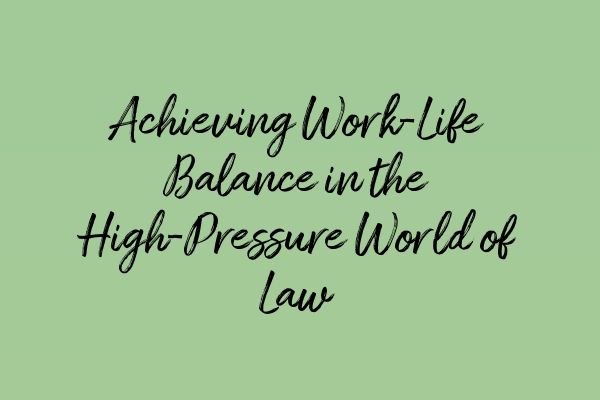Achieving Work-Life Balance in the High-Pressure World of Law
In today’s fast-paced and high-stakes legal industry, achieving a work-life balance can often feel like an elusive dream. The demands of clients, billable hours targets, and a competitive job market can create intense pressure, resulting in long hours, high stress levels, and a constant feeling of being overwhelmed. However, it is crucial to maintain a healthy equilibrium between your personal and professional life to ensure long-term success and happiness in the legal field. In this blog post, we will explore practical strategies and tips to help you achieve work-life balance, thrive in your career, and live a fulfilling personal life.
1. Prioritize Self-Care:
One of the essential aspects of work-life balance is taking care of yourself. It may seem counterintuitive, but investing time in self-care activities can significantly improve your productivity and mental wellbeing. Prioritize regular exercise, sufficient sleep, and a healthy diet to fuel your body and mind. Engage in activities that bring you joy and relaxation, such as hobbies, meditation, or spending quality time with loved ones. Remember, taking care of yourself is not selfish; it is necessary to perform at your best professionally.
2. Set Boundaries:
In a profession known for its demanding nature, setting boundaries is crucial. Learn to say no when you have reached your limit or when a request interferes with your personal life. Establish clear boundaries around your working hours and stick to them as much as possible. Communicate your availability and limitations to your colleagues and clients, ensuring they understand your expectations. By setting boundaries, you create space for yourself and prioritize the important aspects of your life outside of work.
3. Delegate and Collaborate:
As a solicitor, it can be challenging to relinquish control and delegate tasks. However, learning to trust and collaborate with others is vital for achieving work-life balance. Identify tasks that can be assigned to colleagues or support staff, freeing up your time and mental energy. Effective delegation allows you to focus on high-value work and prevents burnout. Remember, collaboration is not a sign of weakness, but rather a way to leverage collective strengths and achieve better outcomes.
4. Time Management:
Effective time management is the cornerstone of work-life balance. Identify your most productive hours and allocate them to high-priority tasks. Use time blocking techniques to schedule dedicated time for work, personal activities, and relaxation. Prioritize tasks based on importance and urgency, and resist the temptation to constantly multitask. Consider utilizing technology tools and productivity apps to streamline your workflow and assist in managing your time more efficiently.
5. Foster Supportive Relationships:
Building a strong support network is vital for maintaining work-life balance in the legal profession. Surround yourself with colleagues, mentors, and friends who understand the challenges you face and can provide guidance and support. Lean on your network for advice, mentorship, and opportunities to collaborate. Additionally, consider joining professional organizations or networking groups where you can connect with like-minded professionals and gain valuable insights.
6. Unplug and Disconnect:
In an era of constant connectivity, it can be challenging to disconnect from work-related matters. However, it is crucial to establish boundaries around technology usage to preserve your personal life and mental well-being. Set clear guidelines for when and where you will engage with work-related communications. Designate tech-free zones during personal time, such as meal times or before bed. By prioritizing disconnecting, you create space for relaxation, rejuvenation, and quality time with loved ones.
7. Seek Flexibility:
Flexibility is becoming increasingly important in the legal industry, with many firms recognizing the benefits of work-life balance for both employees and the organization. Consider discussing flexible working arrangements with your employer, such as remote work, flextime, or compressed workweeks. Propose a well-thought-out plan that highlights the potential benefits to your productivity and overall well-being. Remember, a happy and balanced employee is more likely to be engaged and perform at their best.
In conclusion, achieving work-life balance in the high-pressure world of law is a continuous effort that requires careful planning, prioritization, and self-awareness. By prioritizing self-care, setting boundaries, practicing effective time management, fostering supportive relationships, disconnecting from work, and seeking flexibility, you can create a fulfilling and sustainable career in the legal profession. Strive for balance, and remember that success encompasses both professional achievements and a rich personal life.


Leave a Reply